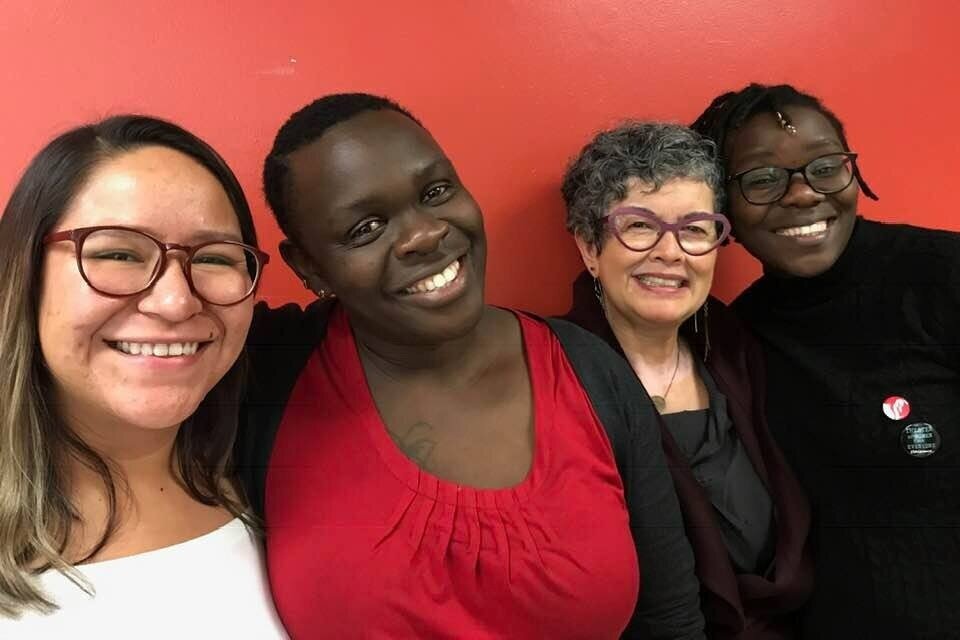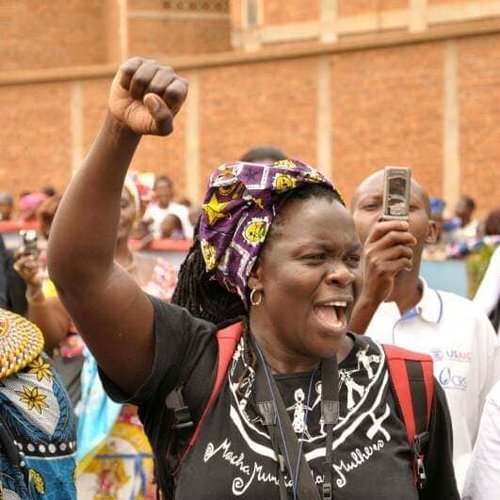Sophie Dowllar Ogutu is pictured here with other visionary leaders during Statera’s 2018 conference in Milwaukee. From left to right, Yasmin Ruvalcaba (Community Engagement Coordinator for Advance Gender Equity in the Arts), Sophie Dowllar Ogutu, Jane Vogel Mantiri (Founder and Board President of Advance Gender Equity in the Arts), and Lydiah Dola.
The Martha Richards Visionary Leadership Award is given annually to a visionary woman or non-binary leader who uplifts, amplifies, and advances marginalized people in the arts. StateraArts established this award to recognize outstanding leaders and support the work of women who are creating pathways for others. The nomination period for this year’s award is closing on June 30th! (Click here to learn how you can nominate someone in your community.)
In celebration of this award, we wanted to catch up with Sophie Dowllar Ogutu, last year’s recipient, to chat about her work and how the current events in the world are shaping her artistry and activism.
About Sophie
Sophie is a mother, an unapologetic women's rights defender, a community mobilizer and organizer, and above all - a feminist artist. She is a key coordinator of The 5 C's Theatre Collective, co-founder of the Mamma Africa Community Centre, a board member of the Kenya Community Media Network (KCOMNET), a mentor with the Girl’s Brigade, and the principal organizer for SWAN Day Kenya. Sophie is also an International Committee Member for the World March of Women, which has led to collaborations with the Grassroots Global Justice Alliance and the Alliance for Food Sovereignty in Africa.
StateraArts: What drives your work?
Sophie Dowllar Ogutu: The communities I work in are full of absolutely amazing people. I have traveled the world in my line of duty and met so many people that positively change lives. The kind of communities I focus on on a daily basis are the ones closest to home. The solidarity, love, and sense of family that I experience with them has shaped me. It has made me a “social artivist,” willing and happy to carry on with whatever this life has to offer! As much as it is very difficult to measure the amount of success that my work brings, I am very much motivated by the results we can see in the community.
SA: What do you love most about your community?
SDO: My community is feminist based. There is a wide range of sisterhood, solidarity, love, and compassion all round. I have seen sisters forfeit all they have to ensure someone else has something they need. There seems to be a clear and silent slogan here that “one person’s dilemma is everyone’s dilemma” or “one sister’s shame is every sister’s shame.” There is a strong commitment to stand and support one another. I have coordinated a grassroots women’s movement locally through the World March of Women, and this is huge! It is a nationwide movement directly affiliated to the international movement. I get to witness people organizing from small groups of five, ten, fifteen…..all the way up to thousands. It always takes my breath away.
SA: What do you wish people knew about what you do?
SDO: I wish people understood the importance of mentorship! I am extremely passionate as a Girl’s Brigade captain. The Girls Brigade is a global, uniformed, disciplined, Christian-oriented movement that started many years ago (1893). As they say, a good leader is one who prepares for their exit. The best way to prepare for one’s exit is by mentoring and passing on the baton.
SA: How are current events in the world shaping or re-shaping your artistry and activism?
SDO: This pandemic has exposed so much and also made me look at things with different lenses. Some people think that the COVID-19 has been an equalizer, because it is a pandemic that cuts across all ages, races, classes of people, sexes. In the past, even with a slight headache, people would rush and take a plane abroad because they either do not trust the health system, or they have the money for “luxurious treatments”. Now anyone who might be carrying COVID-19 is sent to the same quarantine centers as everyone else.
If there has ever been a time that humanity has experienced a clear articulation of inequality and discrimination, that time would be now. The Black Lives Matter movement is making visible the fact that black bodies and black communities are targeted for extreme violence. This is the time to carve out a lasting path of healing. In communities where we live, we see a lot of people frustrated because of loss of jobs and financial insecurities. It has reached a point where communities have to do food banks to support one another. When people have to depend on solidarity and communal food baskets, it leads to a lot of mental health issues.
As an artist, human rights defender, and social activist, it is very difficult. Social spaces were the first to be locked down for proper social distancing. We were of course devastated to have to cancel our SWAN Day event this year. As an arts movement, our responsibility now is to look at how we can conduct a research on healing justice as one of the central areas of our focus. I am putting special attention on looking at women and the effects of this pandemic. Psycho-social support therapies are key to healing this world, and art is a huge part of that.
GUIDELINES
Future recipients of the MRVL Award:
Uplift, amplify, and advance women and non-binary leaders in the arts
Actively create pathways to success and advancement for marginalized artists
Embody Statera’s mission of creating pathways for women and non-binary people in the arts
Uphold the values of intersectional gender equity in their own leadership
_format-1500w.png)

